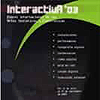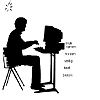 Originally
published
on
08/30/03
Originally
published
on
08/30/03The following is a response/comment by Isabel Saij to a previous report on InteractivA 03 taking place at MACAY, it appears as received (except for minor syntax editing).
---------------------------
As previously announced, some comments after reading your (very interesting) experience/story about your presence in Merida and your participation in Interactiva03. Please consider that this mail is (relatively) short. Some ideas are expressed very directly; in a longer statement I'd introduce, of course, a number of shades. Below are the [4] points I'd like to mention.
1. Museum and officials
The lack of interest and engagement of an official structure is not really surprising. But the question is why? Currently, I see different reasons.
The economic crisis: notable about a crisis is that in our European countries, the first effect is to cut down all credits to art. I'm not so aware of the system in the USA (as far as I know it's different from Europe) but recent examples (Steve Dietz, Mirapaul) prove to be a problem. Of course, the examples are linked with net art but I think it's representative of the general situation for art; the "danger" of netart.
The first difficulty is a technical one. Net art is new and made with computer (hardware, software, codes). The formation and knowledge of leading museum officials is mainly (exclusively?) art history. How can they have an opinion about Internet pieces? The second problem is the net artists. All what I see, all what I read, the personal contacts I have (even only per email) prove that the people involved as net artists are able to think and to create a lot. I'm not quiet sure it's a good starting point to get the attention of officials. What I've seen and experienced in Europe (i.e. Austria, France, and Germany) has made me doubtful about the intention of the officials. An "average" artist with few capacities is easy to manipulate... furthermore, with theory and citations, it's not so difficult to emphasize his/her work. It's a sad situation. I often get angry about it.
The small number of net artists. If a museum withdraws its support to net art, what are the real consequences? The community will send mails and that's it! In the world of art, net art doesn't count, at least not now (I'm completely engaged in net art, web art, and I hope and want this situation to change).
2. Despite the lack of support, Interactiva03 took place. You described how all the artists have hardly worked to "produce" this exhibition. It means artists were able to achieve the project successfully. In my opinion, it was a very positive sign.
-far away from "everybody is an artist," which leads to the boring exhibitions to be seen throughout empty museums and galleries
-the artist as "head only" : very expensive installation with very sophisticated systems that need as well engineers as many workers to be conceived and installed.
3. Meeting with colleagues
I find it necessary too. It's now one of my aims to know personally net artists, to develop professional and personal contacts.
4. Information :Iceca/Thailand
I had almost written this mail when I received from Francis Wittenberger the information about the problems in Thailand. Just a confirmation what I suppose in my point 1-. I've sent a mail to the officials in Thailand to tell them what I think. Francis Wittenberger, who organized the show, let me know per email that this situation was very hard for him (I understand it, of course!) At the same time, I've gotten several mails from French students inviting artists to read and comment on their work around the theme "net art". The interesting thing here is the number of studies on the subject, a clear sign that we are in the 21st century and that art with computer will find its place.
Best
Isabel
---------------------------
Posted by
:: Eduardo Navas ::
Abstraction Now is a show that "presents current tendencies of non-representative art under special consideration of audio-visual media and interdisciplinary approaches." What makes this show interesting is that, besides installations and videos, it also presents net projects. What makes this net part worth looking at is that it gives a good overview of contemporary abstract net art. "The-online-project" (as the organizers call the net-art part) features, amongst others, works by Dextro, Lia, Golan Levin, Jodi, Mark Napier, Nullpointer, Meta and Yugop.
Kčnstlerhaus Wien
29 august-28 september 2003
Mo-Su 10:00-18:00h, Th 10:00-21:00h
Karlsplatz 5, Wien
:: Peter Luining ::
 Originally
published
on
09/02/03
Originally
published
on
09/02/03So far, radical political net-art works have been limited to making available already existing copyrighted material on the net, like for example 0100101110101101.org copy of hell.com. A group(?) called "The Boiler" seems to go even further and claims that it put [printed] a pirated version of the upcoming printed Ars Electronica catalogue 2003 online. What makes this action so special is that the catalogue has yet to appear in print, which will be probably somewhere this month when the actual festival is held. Of course, you can question the actual art value of this action; and you could have reservations about the genuineness of the writings, though the few writings I've read (like Christiane Paul's text about CODeDOC II or John Maeda's "The Infinite Loop") look genuine to me. The fact is the works that deal with publishing copyrighted material seem not yet reached their boundaries; and this kind of work seems to have found in the Internet the perfect medium.
Amongst others, the Ars Electronica 2003 catalogue includes texts by Marc Canter, Florian Cramer, Alexander Galloway & Eugene Thacker, Christiane Paul, Scott deLahunta, Fred von Lohmann, John Maeda, Laurent Mignonneau and Christa Sommerer. They can be accessed through http://eric4511.tripod.com*.
*note: When I checked the URL again the first 2 mirrors seemed to be down.
:: Peter Luining ::
 Originally
published
on
09/01/03
Originally
published
on
09/01/03I was greeted by a very dedicated, fast typist who could switch on the fly from Dutch to English to Japanese; a curious combination. NOBODYHERE uses bugs to represent and intrigue with common ideas. Classic features such as e-card tool and chat are presented with simplicity and wit. Although, the site has limited, if any, critical angle, the skillful use of flash and the images compel exploration and engagement. I did appreciate the use of web technology to strongly compliment the content.
:: ludmil trenkov ::
 Originally
published
on
08/30/03
Originally
published
on
08/30/03Selectparks has been mentioned once or twice here before for its encouragement of and the platform it creates for the games industry, in particular [relating] to small independent companies and artists doing interesting things. 9-11 Survivor is a game mod in development based on the Unreal Game engine that has its documentation and details of its progress hosted on "Selectparks."
A game mod is basically a unit, usually visual or aural, designed for a game that already exists. For example, a designer or artist takes a game such as "Quake" or "Unreal" and uses it (the basic code, the engine) to create a game with their own visuals and sounds. A shoot-em-up has to stay a game with characters either chasing or fleeing from each other; a racing game has to remain a racing game; yet, beyond that, there is plenty of scope to produce interesting re-interpretations of games of the particular chosen genre.
"9-11 Survivor" does exactly this. It reconfigures a game environment / space to tackle current social events and real world spaces. It questions the idea of a 'game' being "An activity providing entertainment or amusement; a pastime" and how a disaster situation can be so over mediated that it ultimately gets translated to a space where it can be instigated at will. A game is genre where players are usually chasing each other to punch, shoot and kill each other in a fantasy environment, but here they are running for survival in a former real world scenario.
Whether this is an outlet for a huge loss (some of the designers seem to have been present at the real disaster) or transgresses the boundaries of taste in terms of respect for the deceased, one thing is certain: that "9-11 Survivor" is an absolutely valid new media art; it questions us, the world, and our relation to it, not because it should but because as "good" art, it must.
:: Garrett Lynch ::